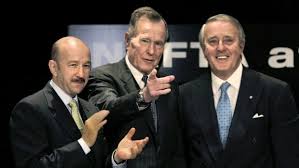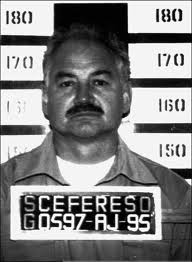Financial Scams and the Bush Family: The Savings & Loan Scandal, the BCCI, the Mexican Drug Cartel, NAFTA

Featured image: Left to Right: Carlos Salinas de Gortari, George H. W. Bush, Brian Mulroney
This article was first published by Global Research in February 2002
The Enron scandal is but the tip of the Iceberg. Fully documented by the US and British media, the Bush family has been implicated in a string of financial scams since the 1980s.
The following text based on a compilation of press excerpts (first published in December 2000 in the wake of the US presidential elections) is self-explanatory.
The personal links between the Bush and Salinas de Gortiari families are also documented. The Salinas family was closely tied to the Mexican drug cartel.
When Carlos Salinas was inaugurated as President, the entire Mexican State apparatus became criminalised with key government positions occupied by members of the Cartel. The Minister of Commerce in charge of trade negotiations leading up to the signing of NAFTA was Raul Salinas Lozano, father of Raul Junior the Drug kingpin and of Carlos the president.
The Bush Family and the Savings and Loans (S&L) Scandal (1980s)
In the 1980s, George W Bush‘s younger brother Neil was involved in the Savings and Loan scam. According to the Los Angeles Times, other members of the Bush family were also involved:
Neil Bush (Source: Wikipedia)
“As a director of the defunct Silverado Savings & Loan in Denver, Neil Bush [brother of George W] was found by federal regulators to have engaged in a conflict of interest by participating in the approval of loans totaling $132 million from the S&L to his own business partners. In 1990, when George W. Bush’s little-known firm, Harken Energy, was awarded a lucrative contract from the Persian Gulf nation of Bahrain, the deal was widely seen as an effort on the part of Bahrain’s royal family to win favor with the White House.
In 1985, Jeb Bush [brother of George W and Governor of Florida] interceded with officials of the Health and Human Services Department on behalf of Miguel Recarey Jr., the owner of a health-maintenance organization who later fled the country after being charged in what is believed to be the nation’s biggest Medicare scandal. Jeb Bush received $75,000 from Recarey for a business deal that never materialized. Likewise, Prescott Bush [brother of former President George Bush] has been accused of taking advantage of his brother’s sympathetic approach to China to negotiate business deals in that country.” (Los Angeles Times, 10 May 1992)
According to the Dayton Daily News:

Marvin Bush (Source: Wikipedia)
“After Silverado, Neil got a $ 2 million loan from the Small Business Administration and walked on it. Son Marvin Bush also has a spotty business record, and our own Gov. Shrub (George W. Bush) was accused of violating securities laws governing insider stock sales when he sold his shares of Harken Oil on the eve of the Persian Gulf war. (Nothing ever came of the allegations.)” (Dayton Daily News, 10 May 1992)
The Bank of Commerce and Credit International (BCCI) Scandal (1992)
According to the Wall Street Journal:
“Lawyers in class-action suit against Bank of Credit and Commerce International identify presidential sons George Bush and Jeb Bush as potential witnesses in their case.”(Wall Street Journal, 10 March 1992)
In the course of his investigation, Manhattan District Attorney Robert Morgenthau in charge of prosecuting the BCCI case had looked into Harken Energy: In a December 1991 story the Wall Street Journal pointed out
”numerous links among Harken, Bahrain and individuals close to the Bank of Credit and Commerce International.” Stephens is one of them. Several years ago, the Journal said, Stephens arranged for a Swiss bank to provide Harken with $25 million at a time when the bank was a partner with BCCI in another project. When snags developed, Stephens lined up Abdullah Bakhsh, whose business partners include an alleged BCCI front man and whose banker had been a large BCCI shareholder. Bakhsh became Harken’s third-largest stockholder — and also owns 10 percent of Stephens’s Worthen Banking.” (quoted in Common Cause Magazine, Spring 1992) “Stephens was the investment banker for Harken Energy, which in early 1990 won rights to drill for oil off Bahrain — surprising since the company had never drilled an offshore well. Further questions were raised because presidential son George W. Bush, a friend of Stephens, serves on Harken’s board. (The San Diego Union Tribune, 17 January 1992)
The Mexican Drug Cartel: What links to Raul Salinas de Gortiari? (1995)
According to the Houston Chronicle and the Ledger (Lakeland, Florida), Jeb Bush (brother of George W) –before becoming Governor of the Sunshine State– was a close friend of Raul Salinas de Gortiari, and brother of former President of Mexico Carlos Salinas. Raul –who was a leading member of the Mexican Drug Cartel– is now serving a 27 year jail term for having murdered a political opponent:

Raul Salinas de Gortiari (Source: ahuizote.com)
“There has also been a great deal of speculation in Mexico about the exact nature of Raul Salinas’ close friendship with former President George Bush’s son, Jeb. It is well known here that for many years the two families spent vacations together — the Salinases at Jeb Bush’s home in Miami, the Bushes at Raul’s ranch, Las Mendocinas, under the volcano in Puebla. There are many in Mexico who believe that the relationship became a back channel for delicate and crucial negotiations between the two governments, leading up to President Bush’s sponsorship of NAFTA.” (Houston Chronicle, 9 March 1995)
The personal relationship between the Bush and Salinas families is a matter of public record. Former President George Bush — when he worked in the oil business in Texas in the 1970s– had developed close personal ties with Carlos Salinas and his father, Raul Salinas Lozano. According to Andres Openheimer writing in the Miami Herald (February 17 1997):
“witnesses say former Mexican president Carlos Salinas de Gortiari, his imprisoned brother Raul and other members of country’s ruling elite met with drug lord Juan Garcia Abrego at a Salinas family ranch; Jeb Bush admits he met with Raul Salinas several times but has never done any business with him.”
According to a report published in The Dallas Morning News, behind the scam was Raul Salinas Lozano, the family patriarch father of Carlos and Raul Junior. The former private secretary to Raul Salinas Lozano:
“told [US] authorities [in testimony] that Mr. Salinas Lozano was a leading figure in narcotics dealings that also involved his son, Raul Salinas de Gortiari, his son-in-law, Jose Francisco Ruiz Massieu, the No. 2 official in the governing Institutional Revolutionary Party, or PRI, and other leading politicians, according to the documents. Mr. Ruiz Massieu was assassinated in 1994.” (Dallas Morning News, 26 February 1997).
According to former DEA Michael Levine, the Mexican drug Cartel was a “family affair”. Both Carlos and Raul were prominent members of the Cartel. And this was known to then US Attorney General Edward Meese in 1987 one year prior to Carlos Salinas’ inauguration as the country’s president.

Back row, left to right: Mexican President Carlos Salinas de Gortari, U.S. President George H. W. Bush, and Canadian Prime Minister Brian Mulroney, at the initialing of the draft North American Free Trade Agreement in October 1992. In front are Mexican Secretary of Commerce and Industrial Development Jaime Serra Puche, United States Trade Representative Carla Hills, and Canadian Minister of International Trade Michael Wilson. (Source: Wikipedia)
When Carlos Salinas was inaugurated as President, the entire Mexican State apparatus become criminalised with key government positions occupied by members of the Cartel. The Minister of Commerce in charge of trade negotiations leading up to the signing of NAFTA was Raul Salinas Lozano, father of Raul Junior the Drug kingpin and of Carlos the president.
And it is precisely during this period that the Salinas government launches a sweeping privatisation program under advice from the IMF. The privatisation program becomes a multibillion dollar money laundering operation. Narco-dollars are channelled towards the acquisition of State property and public utilities.
Richard Barnet of the Institute for Policy Studies, testified to the US Congress (April 14, 1994) that “billions of dollars in state assets have gone to supporters and cronies” (Dallas Morning News, 11 August 1994). These included the sale of Telefonos de Mexico, valued at $ 3.9 billion and purchased by a Salinas crony for $ 400 million.(Ibid). Raul Salinas was behind the privatisation programme. He was known as ”Mr. 10 Percent” “for the slice of bid money he allegedly demanded in exchange for helping acquaintances acquire companies, concessions and contracts [under the IMF sponsored privatisation program”(The News, InfoLatina, .Mexico, October 10, 1997).
NAFTA Negotiations with the Salinas Family
According to the Dallas Morning News report cited above, the Bush administration was fully aware of the links of the Salinas presidency to organized crime. Public opinion in the US and Canada was never informed so as not to jeopardize the signing of NAFTA:
“Other former officials say they were pressured to keep mum because Washington was obsessed with approving NAFTA”.
“The intelligence on corruption, especially by drug traffickers, has always been there,” said Phil Jordan, who headed DEA’s Dallas office from 1984 to 1994. But “we were under instructions not to say anything negative about Mexico. It was a no-no since NAFTA was a hot political football.” (Dallas Morning News, 26 February 1997)
Michael Levine had confirmed that Carlos Salinas role in the Mexican drug cartel was known to US officials including US Attorney General Edward Meese prior to his inauguration as President of Mexico.
US President George Bush is regularly briefed by officials from the Department of Justice, the CIA and the DEA. In other words, at the time the NAFTA Agreement was signed, both Bush and Mulroney must have been informed that one of signatories of NAFTA had links to the Mexican Drug Cartel.
In 1995 in the wake of the scandal and the arrest of his brother Raul for murder, Carlos Salinas left Mexico to take up residence in Dublin. His alleged links to the Drug Cartel did not prevent him from being appointed to the Board of the Dow Jones Company on Wall Street, a position which he held until 1997:
Salinas, who left Mexico in March 1995 after his brother, Raul, was charged with masterminding the murder of a political opponent, has served on the company’s board for two years. He was questioned last year in Dublin by a Mexican prosecutor investigating the murder in March 1994 of Luis Donaldo Colosio, who wanted to succeed Salinas as president. A Dow Jones spokesman last week denied that Salinas had been forced out of an election for the new board, which will take place at the company’s annual meeting on April 16… Salinas, who negotiated Mexico’s entry into the free trade agreement with the United States and Canada, was appointed to the board because of his international experience. He was unavailable for comment at his Dublin home last week.” (Sunday Times, London, 30 March 1997).
Washington has consistently denied Carlos Salinas involvement. “it was his brother Raul”, Carlos Salinas “did not know”, the American media continues to uphold Salinas as a model statesman, architect of free trade in the Americas and a friend of the Bush family.

